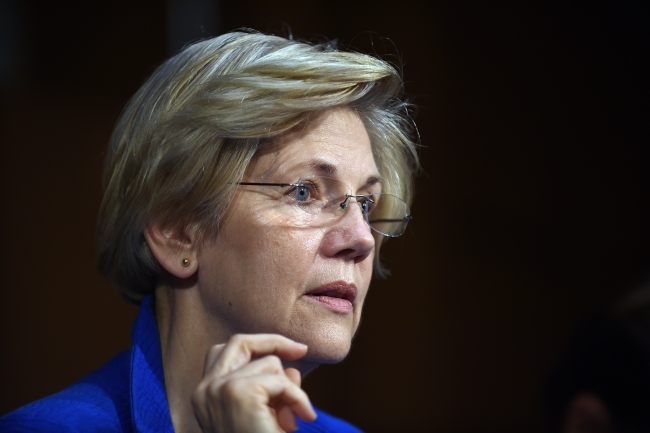You have /5 articles left.
Sign up for a free account or log in.

Senator Elizabeth Warren of Massachusetts, a Democrat.
Getty Images
After years of pressure from consumer advocates and some congressional Democrats, the Obama administration is considering banning or restricting mandatory arbitration agreements at colleges and universities that receive federal funding.
The administration’s proposals, which are being negotiated this week by an Education Department rule-making panel, would make it easier for students to file lawsuits against their colleges, especially for-profit institutions where such arbitration agreements are most common.
For-profit colleges, like many other businesses, often require students, as a condition of enrolling, to agree to settle any disputes through arbitration rather than a court. Critics say arbitration proceedings are often conducted in secret and afford students fewer rights and advantages than they would have in a traditional court proceeding.
Mandatory arbitration agreements, experts say, are largely confined to for-profit colleges. dlAnd critics of those institutions have long pushed the federal government to ban them. Then Senator Tom Harkin’s sweeping 2012 report on for-profit colleges recommended ending the practice for colleges receiving federal student aid, for instance, and some Democrats in Congress have proposed legislation to do that.
Consumer and student advocates won a minor victory last year when the Education Department prohibited the purchaser of Corinthian Colleges campuses, Zenith Education Group, from forcing its students into arbitration.
Education Department officials say they now want to ban or limit arbitration agreements across the board.
“The department is working to ensure that no college can dodge accountability by burying 'gotchas' in fine print that blocks students from seeking the redress they’re due,” Under Secretary of Education Ted Mitchell said in a statement last week.
The department is considering two proposals:
- The first would restrict when colleges could require arbitration of student claims involving “a federal loan” or the education financed by that loan. Colleges would be prohibited from requiring arbitration of claims brought by groups of students (thus allowing them to file in court a class-action lawsuit). But colleges would still be allowed to force individual students into arbitration as long as those arbitration proceedings are open to the public and recorded, among other criteria.
- The second would, more broadly, ban mandatory arbitration of students’ claims that involve “a student loan” or “the provision of educational services.” That protection would apply to both individual and group claims.
Under both proposals, colleges would have to provide copies to the Education Department of complaints that students file against the college either in court or in arbitration (in those cases where it would still be permitted).
Abby Shafroth, a staff lawyer at the National Consumer Law Center, said it is “a positive sign that the department is presenting this for discussion.”
In addition to giving individual student loan borrowers access to the legal system, she said, reducing arbitration and allowing for more class-action lawsuits in the for-profit college industry may help regulators root out illegal behavior.
“It’s about bringing light to illegal misconduct that we might not otherwise know about as well as providing students with a more direct avenue of relief in claims against their schools,” Shafroth said.
For-profit colleges, meanwhile, said they were concerned about the administration’s proposed restrictions.
Steve Gunderson, president of the Association of Private Sector Colleges and Universities, the main lobbying group of for-profit colleges, said in a statement that arbitration “is a reasonable alternative to resolving issues between two parties.”
He added that colleges need protection “from legal harassment and class-action suits originated by lawyers advancing their own interests and political agendas.”
The proposed arbitration restrictions were announced by the Education Department just days before a scheduled vote on John B. King Jr.’s nomination as secretary of education. Senator Elizabeth Warren of Massachusetts had raised the issue of arbitration as part of that nomination process. And some Democrats in the House and Senate, as well as consumer advocacy groups, have been pressing the issue for months.
After initially declining to take up the arbitration ban, the Education Department late last week added it to the agenda of a rule-making session that was already underway to craft a new debt relief process for defrauded student loan borrowers.
Aside from pending regulations on teacher preparation programs, the regulations under consideration by the rule-making panel this week are likely to be the Obama administration’s last crack at changing federal higher education rules before leaving office.
Warren, in an unusual move for a member of Congress, appeared before the rule-making panel in person on Wednesday to urge negotiators to adopt strong debt relief rules as well as the proposed ban on arbitration.
Mandatory arbitration agreements, Warren said, “deny students their day in court” and encourage more fraud.
“There is no epidemic of frivolous lawsuits against upstanding colleges,” she added. “If you don’t cheat students, you won’t get sued.”
Warren was joined by Representative Maxine Waters of California, a Democrat who chairs the House financial services committee, who similarly called on the panel to adopt the mandatory arbitration proposal.




